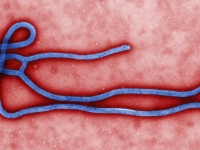Health
1st Ebola patient diagnosed in U.S. dies at Dallas hospital
USPA News -
A Liberian man, who traveled to Texas before falling ill and becoming the first patient to be diagnosed with Ebola in the United States, died at a hospital in Dallas on early Wednesday morning, officials said. There is no indication that others have been infected.
Wendell Watson, a spokesman for Texas Health Presbyterian Hospital Dallas, said Thomas Eric Duncan died at 7:51 a.m. local time even though officials had indicated the previous day that Duncan`s condition - while critical - had stabilized. "Mr. Duncan succumbed to an insidious disease, Ebola. He fought courageously in this battle," the spokesman said. Watson, in an emailed statement, added: "Our professionals, the doctors and nurses in the unit, as well as the entire Texas Health Presbyterian Hospital Dallas community, are also grieving his passing. We have offered the family our support and condolences at this difficult time." Duncan left the Liberian capital of Monrovia on September 19 and arrived in Dallas the next day after taking flights that took him to airports in Brussels and the Washington, D.C. area before landing at Dallas/Fort Worth. He fell ill four days later and sought medical care on September 26, only to be turned away before being hospitalized on September 28 after developing symptoms consistent with Ebola. The Centers for Disease Control and Prevention (CDC) confirmed on September 30 that Duncan had tested positive for Ebola, making him the first person to be diagnosed with the deadly virus outside of Africa, although the infection itself took place in Liberia. A Spanish nurse in Madrid has since become the first person to have been infected outside of Africa. Several people who were in close contact with Duncan while he was ill remained in quarantine on Wednesday, although there was no indication that any of his contacts had contracted the virus. Authorities have also ruled out any risk to passengers who traveled on the same flights as Duncan because Ebola victims are only contagious when they are experiencing active symptoms. The Ebola outbreak in West Africa is believed to have started in Guinea in December 2013 but it was not detected until March, after which it spread to Liberia, Sierra Leone and Nigeria. The current outbreak features the Zaire strain of the Ebola virus, which is considered to be the most aggressive and deadly strain, having killed up to 9 out of 10 infected in previous outbreaks. As of October 3, at least 7,493 people have been infected with Ebola since the outbreak began, including 3,440 people who died of the disease, according to health authorities in the countries involved. Ebola is a highly infectious disease and kills its victims in a very short time. Signs and symptoms include high grade fever, vomiting, diarrhea, abdominal pain, headache, measles-like rash, red eyes and, in some cases, bleeding from body openings. The ongoing outbreak is the worst ever of its kind and coincides with an unrelated Ebola outbreak in the Democratic Republic of Congo. The virus, for which there is no cure or vaccine, can spread through direct contact with body fluids such as saliva, blood, stool, vomit, urine, and sweat but also through soiled linen used by an infected person. It can also spread by using skin piercing instruments previously used by an infected person or by touching the body of a person who died of Ebola. It is not airborne. In a statement earlier this week, the World Health Organization (WHO) attempted to quell fears that Ebola can spread through coughing or sneezing, which has never been proven. "Speculation that Ebola virus disease might mutate into a form that could easily spread among humans through the air is just that: speculation, unsubstantiated by any evidence," the WHO said. The first outbreak of Ebola in 1976 in Zaire - which is now the Democratic Republic of Congo - had been the deadliest until the current outbreak, killing at least 280 people and sickening 38 others, putting the fatality rate at 88 percent. The Ebola outbreak in Uganda in 2000 had long been the largest ever recorded, killing 224 people and sickening at least 201 others.
Liability for this article lies with the author, who also holds the copyright. Editorial content from USPA may be quoted on other websites as long as the quote comprises no more than 5% of the entire text, is marked as such and the source is named (via hyperlink).






